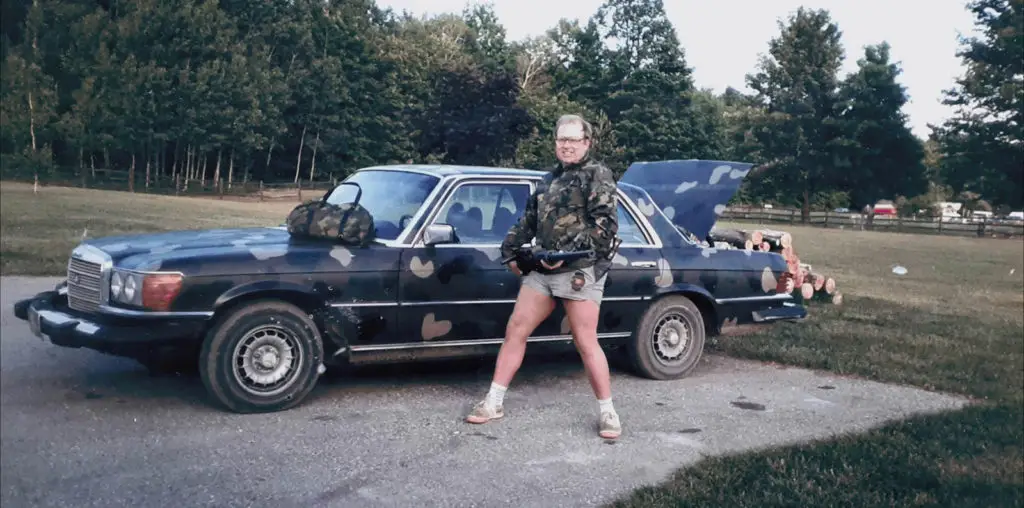
Set during the run up to the 2008 Presidential election amid turbulence in the financial markets, this third feature from Andrew Dominik, the director of “The Assassination of Jesse James by the Coward Robert Ford,” marks the writer-director’s return after a 5-year feature hiatus (it was 7 years between his first film “Chopper” and “Jesse James”). “Killing Them Softly” is a somber and brutal meditation on gangsters sloppily duking it out amongst themselves in a grim cityscape. The depressed economy plays against the simple plotline, as both Obama and McCain command too much prime real estate (in background radio, television, and other media positions), while the main characters play out criminal games of diminishing proportions. Do Mafia types really all listen to CNN and all-news radio? Anyway, it’s a sullen tale told with a cornucopia of goodfella stars (Ray Liotta, James Gandolfini, Vincent Curatola), as well as Brad Pitt, back for another round with Dominik, trading in his 19th-century, Wild West outlaw wardrobe for that of a leather-jacketed, slick-haired enforcer, Jackie Cogan, who brandishes an intelligent, Zen-like ruthlessness to his profession.
The source material, “Cogan’s Trade” by George V. Higgins, was first published back in 1974, just after the author’s “The Friends of Eddie Coyle” was filmed by Peter Yates, with Robert Mitchum starring. Dominik admired the writer’s realism (Higgins was a prosecuting attorney in Boston for two decades), and massaged in a concept that the economic crisis was affecting many businesses, and that gangsters can suffer along with everyone else. It doesn’t flesh out all that well, as far as I’m concerned, although I admired how the director got some fine performances out of his cast, particularly Scoot McNairy (“Monsters“) and Ben Mendelsohn (“Animal Kingdom“) as two low-lifes in search of an easy score.
Although shot in New Orleans, the film’s setting appears to be an economically-challenged neighborhood just outside New York City, or in a bad section of Chicago, or the wrong section of Boston; take your pick. Wiseguy Johnny Amato (Curatola) has a “fool proof” scheme to rob a mob-protected card game run by Markie Trattman (Liotta), who, some years earlier, gained a peculiar notoriety for masterminding the robbery of his own game—only to blab about it later. Johnny thinks that any new similar larceny will foist blame anew on Markie, even if he’s not involved in it.
Unfortunately the two penniless ex-cons he hires are either too jittery (Frankie, played by McNairy) or on a continual, drug-induced high—the sublimely seedy Russell (Mendelsohn), an Aussie also involved in a lamebrained dog theft scheme. They’re all f*****g screw ups (and the onscreen profanity is abundant, fyi) and could use a week-long shower to wash off the caked-on layers of grime and grease. A shave and a toothbrush would help, too.
Jackie gets called in by the unseen corporate gangsters to take care of the situation, his go-between being a bean-counting middle manager (a cool and collected Richard Jenkins). To help provide punishment where it is due, Jackie brings in another ex-con, Mickey (Gandolfini), who breaks parole, and then breaks himself with an overabundance of personal baggage—a relationship gone bad—that takes him to hellish extremes, and forces Jackie to make a burdensome decision. This is not your father’s Tony Soprano.
There is some occasionally lightheaded comedy to break the dour mood, especially during several of Russell’s drug-induced escapades. Director of photographer Greig Fraser creates a dandelion-esque focus that provides an interest approach to his condition.
It’s a middling gangster film, but belabored with too much Sturm und Drang, particularly in banging over the audience’s head the constant reminders of the fiscal cliff. This won’t be a film that endears itself to a large crowd of moviegoers, although mid-range criminals and economists might want to hit the bargain matinees.


After hearing nothing but good about this film, finally a review that reads like it wasn’t written to kiss Pitt’s a*s. Thank you.